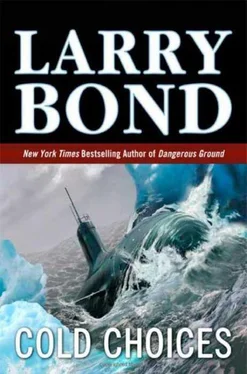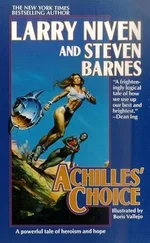* * *
It was bright, the sunlight from a clear sky doubled as it reflected off a concrete runway. His helmet visor was down, reducing the glare. Jerry watched the instruments as he advanced the throttle. He felt the engines pushing hard, fighting the brakes, but he counted carefully, waiting. The engine temperatures stayed in the green, and he released the brakes.
Jerry recognized the dream. He’d been here many times before. He watched the speed on the heads-up display shoot up, the numbers quickly passing one hundred knots, then one-twenty, one-forty, changing as quickly as he could read them. The runway became a white blur in front of the nose. He’d have takeoff speed any second.
There he felt the whole airframe shudder, and the nose swerved right. He’d blown a tire. Used to making feather-light corrections, he was slow correcting, but even full left on the controller didn’t stop the swerve. He’d chopped the throttles, but that didn’t help either. He was almost crossways on the runway, still moving, and he felt the right wing lift up. He was going to roll.
He reached for the loops at the top of the ejection seat, but they weren’t there, and instead of sitting in the cockpit of his Hornet, he was standing now, in the bridge cockpit of Seawolf, but they were submerged, and he could see the Russian sub. It was to his right, bow-on.
It was huge, and he could see every detail of the boat — the pattern of the anechoic tiles on the hull, the silver patch of the bow sonar window, the intake scoops back by engineering. In spite of the props furiously churning the water, it was almost motionless, pointing straight at him. Jerry frantically tried to avoid the oncoming vessel, but no matter which way he turned Seawolf, the Russian’s bearing never changed.
He never saw the collision, but suddenly he was hanging in the air from his chute over the twisted wreckage of Seawolf and the Russian submarine, lying together across the runway. Rescuers and emergency vehicles crowded around the two crushed hulls, reminding him of a train wreck.
Then he was standing next to an ambulance, and they were loading Dennis Rountree into it. He was looking at Jerry, and Jerry kept saying, “I’m sorry,” louder and louder, but Rountree kept shaking his head, as if he couldn’t hear. Then they started loading the rest of the crew into the ambulance, first Rudel, then Shimko, and then some of the chiefs, then.
The alarm woke him, shivering and disoriented. He lay in his bunk for several minutes, reaching out to touch the bulkheads and familiar objects around him. Jerry read and reread the time on the alarm clock. He recited the name of his boat, his billet, where they were. The images from the dream lingered, and he had to work to shake them off.
Jerry got up and silently dressed and washed. Chandler was asleep, but the red light in the stateroom was enough for his purposes.
His first stop was control. They were on course, on track for Faslane. QM2 Dunn seemed barely awake, but he’d tended the chart properly.
The electronics equipment space looked cleaner, but red danger tags hung from a lot of the gear, and two ratings were at work. He didn’t bother them. He’d get a report from Chief Hudson before breakfast. Instead, he headed back to control.
It was quiet at that hour, and he took over one of the plotting tables, used only when they were tracking a target. Will Hayes was the OOD, and after making sure that he couldn’t be of any help, left Jerry to his work.
He started building a timeline on his laptop, first working with the deck log. That recorded all the course and speed changes along with all the reports from other stations. The sonar logs told him when the other boat was detected, its bearing, and gave hints about its speed and direction.
Breakfast time came and went, but Jerry was on a roll. It felt good, satisfying, to patiently piece together the scraps of data into a coherent picture. Order from chaos, reason from insanity. And it drove out the unpleasant images from his dream.
He wasn’t looking for patterns or meaning, not yet. He didn’t have a lot of good information on the Russian’s position, only his bearing and range from Seawolf when the wide aperture array had a good lock on him. He didn’t know exactly when the Russian had changed course. That took time to compute, given the sparse range data to work with, and the Russian had maneuvered often and quickly.
STSC Carpenter showed up in control after breakfast. He brought Jerry coffee and one of the cook’s sweet rolls, and more data. Carpenter’s report was clearly an extract of their analysis, and Jerry wondered what they’d found out but couldn’t share with him. He noticed that their Russian was described as probably a new “first line nuclear attack sub.”
But what they’d shared with him was very helpful. Because they could see the narrowband tonals from the Russian’s propulsion train, they’d been able to figure out when his speed had changed, and calculated what his speed was as he passed by them. Like an ambulance with its siren blaring, the sound changes as the ambulance approaches you and then drives by. At the closest point of approach, the noise from the Russian submarine was what he really sounded like. With this data, the sonar techs were able to map his propulsion train and thus, determine his speed.
Hudson came by with a progress report, and Jerry asked him to brief the XO as well.
Jerry was adding in speed changes from the engineering log when he realized that the XO was standing behind him.
“Good morning, sir.”
“You’ve made a lot of progress, Jerry.”
“It’s incomplete, XO.”
“And it will be, unless the Russian’s deck log is in that pile somewhere,” remarked Shimko with a broad grin. Then more seriously, “Still, it will be very useful.”
He leaned closer, as if to examine the plot, and spoke softly. “I’m hoping it will convince the captain that the collision was not his fault.”
Jerry had to fight to control his reaction. The encounter had been hashed over last night, and he heard it rehashed in the control room this morning. Most of the crew thought they were lucky to be alive, and that Rudel had been the only thing keeping them from an icy, wet end.
When Jerry didn’t immediately reply, Shimko explained. “You know how much the Skipper cares about this crew and this boat. They’re a part of him. He’s hurting because Seawolf is hurting. I checked on him a couple times during the night, and he didn’t sleep at all. He just sat there, writing draft after draft of a letter to Rountree’s parents.”
Jerry felt another pang of responsibility himself. In the back of his mind he’d been trying to see if he’d missed a chance to grasp the Russian’s purpose. It was hard to second-guess a “failure of the imagination,” but he kept thinking that he should have realized what was happening.
“I would like to show him, and anyone else, Jerry, that given the circumstances we were in, and the data we had on hand, Tom Rudel made the right calls.”
Shimko straightened up and Jerry saw that he didn’t look like he had slept much either. As if on cue, the XO stretched and stifled a deep yawn.
“Keep at it, Jerry. I need a logical, cogent analysis of the events leading up to the collision if I’m going to get through to the Skipper. Stay objective. I need an honest assessment based on facts, not sympathy. The Captain isn’t about to let us blow sunshine up his skirt.”
“Yes, sir. I’ll do my best.”
The XO nodded appreciatively. Then, reaching down and putting his hand on Jerry’s shoulder, he said, “A wise man once said, ‘The difficulties in life are intended to make us better, not bitter.’ Well, right now, our Captain is slowly gnawing away at his stomach lining based on a belief that he made a mistake. We need to show him, if we can, that it wasn’t his fault. We owe him that much, at least.”
Читать дальше












